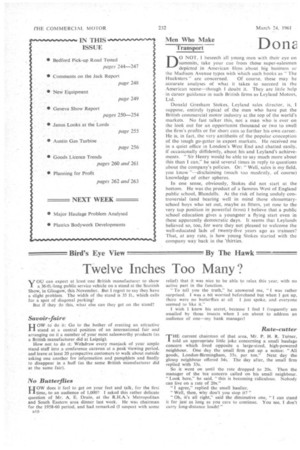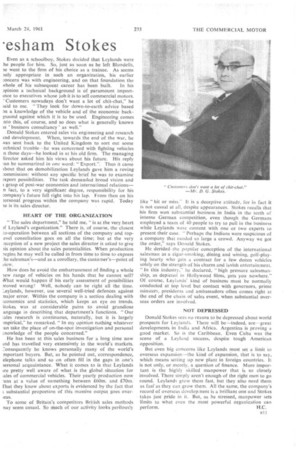Men Who Make
Page 44

Page 45

If you've noticed an error in this article please click here to report it so we can fix it.
Transport Don .esham Stokes DO NOT, I beseech all young men with their eye on summits, take your cue from those super-salesmen depicted in American films about big business or the Madison Avenue types with which such hooks as "The
Hucksters" are concerned. Of course, these may be accurate analyses of what it takes to succeed in the American scene—though I doubt it. They are little help in Career guidance in such British firms as Leyland Motors, Ltd.
Donald Gresham Stokes, Leyland sales director, is, I suppose, entirely typical of the men who have put the British commercial motor industry at the top of the world's markets. No fast talker this, not a man who is ever on the look out for an opportunist thousand or two to swell the firm's profits or for short cuts to further his own career. He is, in fact, the very antitheSis of the popular conception of the tough go-getter in export markets. He received me in a quiet office in London's West End and chatted easily, if occasionally diffidently, about his and Leyland's achievements. "Sir Henry would be able to say much more about this than I can," he said several times in reply to questions about the company's policies. Or: "Well, sales is my field, you know "—disclaiming (much too modestly, of course) knowledge of other spheres.
In one sense, obviously, Stokes did not start at the bottom. He was the product of a famous West of England public school, Blundells. At the risk of being unduly controversial (and bearing well in mind those elementaryschool boys who set out, maybe as fitters, yet rose to the very top position in powerful firms) I believe that a public school education gives a youngster a flying start even in these apparently democratic days. It seems that Leylands believed so, too, for were they not pleased to welcome the well-educated lads of twenty-five years ago as trainees? That, at any rate, is how young Stokes started with the company way back in the 'thirties.
Even as a schoolboy, Stokes decided that Leylands were he people for him. So, just as soon as he left Blundells, le went to the firm of his choice as a trainee. As seems mly appropriate in such an organization, his earlier :oncern was with engineering, and on that foundation the xhole _of his subsequent career has been built. In his minion a technical background is of paramount importtrice to executives whose job it is to sell commercial motors. 'Customers nowadays don't want a lot of chit-chat," he ;aid to me. "They look for down-to-earth advice based m a knowledge of the vehicle and of the economic back;round against which it is to be used. Engineering comes nto this, of course, and so does what is generally known business consultancy' as well."
Donald Stokes entered sales via engineering and research end development. When, towards the end of the war, he vas sent back to the United Kingdom to sort out some echnical trouble—he was concerned with fighting vehicles n those days—he looked in at his old firm. The managing lirector asked him his views about his future. His reply :an be summarized in one word: "Export.". Thus it came ebout that on demobilization Leylands gave him a roving eommission: without any specific brief he was to examine export possibilities. The task demanded broad vision and e grasp of post-war economics and international relations— n fact, to a very significant degree, responsibility for his :ompany's future fell right into his lap. From then on his )ersonal progress within the company was rapid. Today le is its sales director.
HEART OF THE ORGANIZATION "The sales department," he told me, "is at the very heart )f Leyland's organization." There is, of course, the closest :o-operation between all sections of the company and topevel consultation goes on all the time; but at the very aception of a new project the sales director is asked to give lis opinion about the sales potentialities. When production )egins he may well be called in from time to time to express he salesman's—and as a corollary, the customer's—point of iiew.
How does he avoid the embarrassment of finding a whole iew range of vehicles on his hands that he cannot sell? What would happen if his early assessment of possibilities ,roved wrong? Well, nobody can be right all the time. ...eylands, however, use several well-tried defences against najor error. Within the company is a section dealing with economics and statistics, which keeps an eye on trends. ;takes was at considerable pains to avoid grandiose anguage in describing that department's functions. "Our ,ales research is continuous, naturally, but it is largely .mpirical," he remarked. "in my opinion nothing whatever • an take the place of on-the-spot investigation and personal c.nowledge of the people concerned."
He has been at this sales business for a long time now end has travelled very extensively in the world's markets. :.onsequently he knows personally many of the world's mportant buyers. But, as he pointed out, correspondence, elephone talks and so on often fill in the gaps in one's )ersonal acquaintance. What it comes to is that Leylands ere pretty well aware of what is the global situation for ales of commercial vehicles. Their yearly production now sins at a value of something between £60m. and £70m. flat they know about exports is evidenced by the fact that substantial proportion of this massive output goes overvas.
To some of Britain's competitors British sales methods nay seem casual. So much of our activity looks perilously like " hit or miss." It is a deceptive attitude, for in fact it is not casual at all, despite appearances. Stokes recalls that his firm won substantial business in India in the teeth of intense German competition, even though the Germans employed a team of 40 people to try to pull in the business while Leylands were content with one or two experts to present their case. " Perhaps the Indians were suspicious of a company that needed so large a crowd. Anyway we got the order," says Donald Stokes.
He derided-the popular conception of the international salesman as a cigar-smoking, dining and wining, golf-playing hearty who gets a contract for a few dozen vehicles solely on the strength of his charm and lavish entertainment. " In this industry," he declared, "high pressure salesmanship, as depicted in Hollywood films, gets you nowhere." Of course, Leylands' kind of business must be normally conducted at top level but contact with governors, prime minsters, presidents and ambassadors often comes right at the end of the chain of sales event, when substantial overseas orders are involved.
NOT DEPRESSED Donald Stokes sees no reason to be depressed about world prospects for Leylanc13. There will be—indeed, are—great developments in India and Africa. Argentina is proving a good market. So is the Caribbean. Even Cuba was the scene of a Leyland success, despite tough American opposition.
But even big concerns like Leylands must set a limit to overseas expansion--the kind of expansion, that is to say, which means setting up new plant in foreign countries, It is not only, or merely, a question of finance. More important is the highly skilled manpower that is so closely involved. There simply aren't enough of the right men to go round. Leylands grow them fast, but they also need them as fast as they can grow them. All the same, the company's record of overseas develop:I-lent is a brilliant one and Stokes takes just pride in it. But, as he stressed, manpower sets limits to what even the most powerful organization can
perform. H.C.




































































































































